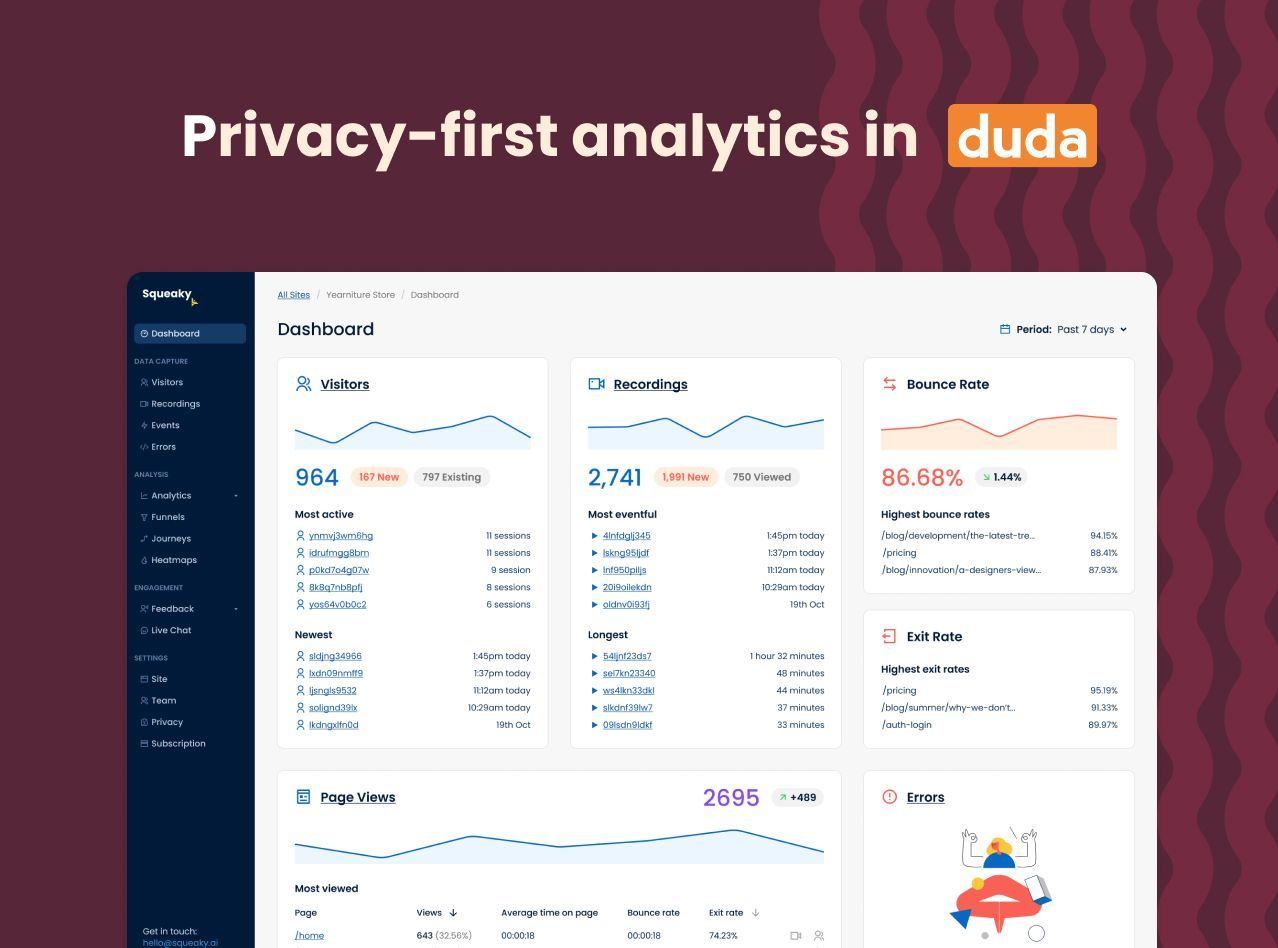This blog post was written by
Chris Pattison, a former agency owner and the cofounder of
Squeaky Analytics. Chris has spent 14 years working in agencies and SaaS companies, leading design and product teams to deliver high growth, award winning user experiences.
If you’re using analytics tools when helping your clients to improve their websites, you’ll be familiar with the ongoing concerns around privacy and data protection, but perhaps not where these concerns originate. Why do agencies need to pay attention to privacy and compliance regulation, and how can they continue to support their clients in this new privacy-centric world?
Well, as the co-founder of an analytics company, and a former agency owner, I can hopefully offer some helpful thoughts and advice. In this article, I’ll briefly outline where the recent concerns around privacy originated, how changes in data privacy have impacted traditional analytics tools, and the many upsides of switching to a privacy-friendly solution.
A digital wild west
With the emergence of
Web 2.0 came a modern-day gold rush, but instead of picks, shovels, and gold, technology companies began capturing, storing, and analysing a new asset class: user data. This new wild west led to incredible profits and growth for many digital businesses and supported the rise of household names like Meta and Google, but it came at the expense of user privacy.
It wasn’t just big businesses either, a huge share of companies began installing analytics software on their websites and apps, hoping to leverage data to increase the quality of their goods and services, as well as their profits.
And, honestly, it worked! Data-driven businesses have been the
proven winners in our digital world, using analytics data to power their decision-making company-wide.
So, what’s the big deal? Well, to put it simply, it has come at a cost. You see, knowing which products on your site sell best is vital. However, companies rarely stopped there as their analytics tools scooped up everything - names, email addresses, dates of birth, blood types, and anything else they could get their hands on.
The thing is, not only did most users not know this was happening, but most companies didn’t need so much data, and they didn’t have the data protection practices and controls in place to deal with it. This led to
huge leaks, and
immoral or illegal uses of personal data for company profit that support identity theft, political manipulation, and just about every other kind of digital crime you can imagine. Something had to give, and where companies wouldn’t act in the face of consumer backlash and scandal, regulators had to act.
Taming the beast
There has been a host of legislative responses to the rampant capture of personal data and the failures of data protection - perhaps most notable is the European Union’s
General Data Protection Regulation (GDPR), which came into effect in May 2018.
The GDPR introduced stringent rules around data protection, including requirements for businesses to obtain clear consent from users before collecting personal data, and it also gave users the right to know what data is being collected and the ability to opt out.
Non-compliance with GDPR can result in significant fines, up to 4% of a business's annual global turnover.
However, the EU are not alone in this mission:
- 🇺🇸 The
California Consumer Privacy Act (CCPA) came into effect in January 2020, offering similar protections for California residents.
- 🇧🇷 In Brazil, the
General Data Protection Law (LGPD) was enacted in August 2020, reflecting similar concerns around user data protection.
- 🇮🇳 Similarly, India's Personal Data Protection Bill is due this summer (2023). Expected to be passed by July or August 2023.
These bills are all great examples of the growing global trend towards heightened user data protection. So, what does this mean for agencies and their clients?
Implications for agencies
Just as changing consumer preferences and emerging legislation have had an impact across digital industries, so too have they impacted agencies. Indeed, web agencies that continue to use legacy analytics tools are opening themselves up to several risks, including, but not limited to:
- Legal and financial risks of non-compliance: As we’ve already covered, data protection laws like GDPR and CCPA impose strict rules on the collection and processing of personal data. Conventional analytics tools tend to collect data indiscriminately and may not be in compliance with these laws. Non-compliance can result in hefty fines, as well as damage to you or your client’s reputation.
- Loss of customer trust: With growing awareness about data privacy issues, customers are becoming more wary of companies that collect their data unnecessarily and they expect reasonable and transparent data capture. If they find out companies have been capturing personal data without their consent, it can often lead to serious backlash and commercial consequences.
- Huge gaps in your data: Legacy analytics tools rely on cookie-based tracking, which has become synonymous with privacy-violating practices. Because of this, 42% of users now choose to reject the use of cookies, which means your cookie-based analytics product could have a 42% gap in the data it’s capturing. This means you and your clients will be making decisions without having the full picture of your user experience.
- Data Breaches: Legacy analytics tools often collect more data than necessary, including a lot of personal data on users. This makes them a prime target for
cybercriminals, with resultant data breaches leaving you and your clients exposed.
- Failure to Future-Proof: With data privacy legislation only set to increase, sticking with older analytics tools means continually playing catch-up, this is expensive and will lead to you and your clients losing trust in the tools you’re using, the data being captured, and the insights on offer.
So where does that leave your agency? You want to offer your customers a competitive advantage by providing meaningful data on the performance of their website and their user experience, but you also recognise the evolution of consumer demands and the fast-changing regulatory landscape. The answer is simple, it’s time to switch to a more modern, privacy-friendly analytics tool.
Privacy-friendly analytics
In response to the growing need for privacy-centric solutions, a new breed of analytics tools has emerged, where avoiding the arbitrary capture of personal data is the number one priority. These tools are known as privacy-friendly analytics, and this is the category that my company, Squeaky, fits into.
Squeaky is one of the few future-proof and fully compliant analytics tools on the market, and it’s also the first web analytics tool available in the Duda app store, so let me take a moment to explain why I think it could be the right choice for you and your clients…
No compromises
Firstly, the most important thing to know about Squeaky’s privacy-first analytics is that you won’t be compromising on the quality of the data you capture or the value of the insights you’ll gain.
That may sound counterintuitive, but in reality, 95% of the functionality and value in an analytics tool comes from non-sensitive data, and this is most valuable when aggregated to analyse patterns and trends in your user experience. Privacy-friendly analytics solutions recognise this, and simply avoid defaulting to the use of invasive tracking technologies like cookies or IP-based tracking, or the capture of any other types of personally identifiable information (PII).
In addition, other key benefits of privacy-friendly analytics include:
- No compliance issues: Out of the box, Squeaky doesn’t collect any personal data on your website visitors. This means no worries about GDPR, CCPA, LGPD, or any other data protection law.
- No Cookies: Squeaky also doesn’t use cookies or IP-based tracking, which means no more "Accept Cookies" pop-ups, and no more missing data because of cookie rejection. You get a complete and accurate picture of user behaviour.
- Actionable Insights: By focusing on user behaviour, rather than user data, Squeaky avoids capturing sensitive data whilst still providing the insights and actionable analytics you and your clients expect.
- Future-Proofing: With Squeaky, you're not just complying with current regulations, you're anticipating future ones. As privacy regulations continue to evolve, Squeaky ensures you stay ahead of the curve, offering you and your clients peace of mind.
- User Trust: By using a privacy-friendly analytics tool like Squeaky.ai, you're showing your clients and their users that you respect their privacy. This can help to build trust and loyalty, which are invaluable in today's digital landscape.
Not only are you safeguarding the interests of you and your client, you’re also not missing out on features either, because Squeaky comes with all the standard functionality you’d expect, like analytics, heatmaps, session recording, event tracking, and more.
Conclusion
With the rise of data privacy concerns and stricter regulations, legacy analytics tools are no longer a viable option for most agencies. By switching to a privacy-friendly tool, agencies can provide better quality data capture and insights, avoid legal and financial risks, and build trust with their customers.
Moreover, privacy-friendly analytics tools like Squeaky continue to provide all the functionality you’ve come to expect in a great analytics product…oh yeah, and you can install it in Duda with just one click.










